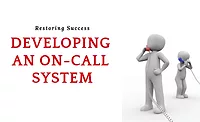Restoring Success
#MOGA: Make On-Call Great Again

In the restoration industry, being on-call in some capacity is part of the job. In recent years, many seem to view the commitment to being on-call as a drawback rather than part of responsibility and reward that a career in restoration offers.
A positive outlook is where it all begins. The following perspectives, from experienced restorers who serve in an on-call leadership capacity, are valuable. The perspective of the on-call leadership not only allows us to focus on the positive but also influences the rest of the on-call team, company, culture, and the industry at large. Attitudes are contagious; passing along good on-call leadership vibes and positive on-call attitudes will help Make On-Call Great Again.
Pete has been in the industry for over 11 years and he recalls his interview at J.C. Restoration over 10 years ago:
When I interviewed at JC Restoration over 10 years ago, I sat with the Owner and President Warner Cruz. I remember him asking me specifically what I enjoyed most about the restoration industry. The answer I gave him still holds true to this day - emergency responding - the opportunity to gear up, rally the troops, and lead the charge in helping families and/or businesses in their time of need. I knew that we would be one of the first teams out to assist when others needed us the most. We were the first step; we were the knights in shining armor – it’s that exciting opportunity that fuels my passion to help others in the restoration industry daily. I truly believe that the initial emergency response team plays a big part in the end result - how we make our customers feel from the onset will positively set the tone for the duration of any given project.
Jon, an on-call leader for more than 10 years, points out:
I enjoy being able to do what I love as a restorer, without some of the regular pressures and distractions that the normal business day entails. I have complete focus on the customer and the team, and enjoy mobilizing into action to help others in a time of need.
Barry, with nearly 15 years in the industry, reflects on a very specific type of after-hour call:
I feel greatly rewarded when I respond to a biohazard/trauma scene. My compassion and empathy are heightened and I am filled with a deep sense of purpose in serving those who have called upon me during what may be one of the most difficult times of their lives. When the remediation is complete, there is deep appreciation from those being served; it is particularly fulfilling and rewarding for me.
A career in restoration demands a commitment to the customers call in need of action, 24/7. Let’s make it great again and keep it great:
-
On-Call Leadership: The leadership sets the tone and influences how others perceive and view on-call.
- The call: When calling the team in for after-hours duty, it should be done so in a positive and constructive manner. Imagine the impact of calling a team member at 1:00 a.m.: “Hi Joe – You need to get up! It stinks! We just got a big sewer backup an hour away.” Find a better, more positive way to call.
- Set a good example: Stay positive and engage the team accordingly.
- Teamwork: The thrill of teamwork can be at its peak after-hours. When possible, work along-side the team. Foster the comradery and bonding that can be enjoyed by tackling after hours calls through the challenges and the successes.
- Care: Take care of the team and keep them motivated. Food, drinks, and gestures of gratitude and appreciation can go a long way.
-
Companies: At the company level, we can build a foundation that involves the on-call commitment that will help Make On-Call Great Again:
-
Interview and On-boarding: In addition to thoroughly explaining the on-call commitment and expectations of a career in restoration, we also want to fully engage and give understanding, Why do we offer fast, 24/7 service?
- We do this to “reduce further damage” or mitigate damage. This is true of nearly all the services offered from water to fire.
- It is the ultimate show of empathy and support to those we serve. The assurance of trained and caring restoration professionals on site at the time of loss gives people the peace of mind and support they need after they have experienced damage to their property.
- On-Call System/Expectations: It is important that the expectations are clear and communicated. The following article includes some useful tips for developing a system: Developing an On-Call System. Included in the system should be a substitution or back up process.
-
Interview and On-boarding: In addition to thoroughly explaining the on-call commitment and expectations of a career in restoration, we also want to fully engage and give understanding, Why do we offer fast, 24/7 service?
- Individuals: While staying focused on the benefits and rewards of a career in restoration, there is personal responsibility to maintain positive balance.
- Utilize a calendar system to manage your time
- Plan personal time off in advance
- Develop or utilize systems for back up coverage (and be sure to reciprocate to your co-workers)
- Have a positive mental attitude
- Prioritize time with family/friends
- Travel,
- Rest/Sleep
- Unplug: Hobbies, exercise, sports, music and entertainment
Enjoy the reward of serving as a restorer, 24/7. Share the pride and joy of your work #MOGA.
Looking for a reprint of this article?
From high-res PDFs to custom plaques, order your copy today!







